Boethius
Anicius Manlius Severinus Boëthius,[lower-alpha 1] commonly called Boethius[lower-alpha 2] (/boʊˈiːθiəs/; also Boetius /-ʃəs/; c. 477 – 524 AD), was a Roman senator, consul, magister officiorum, and philosopher of the early 6th century. He was born about a year after Odoacer deposed the last Western Roman Emperor and declared himself King of Italy. Boethius entered public service under Ostrogothic King Theodoric the Great, who later imprisoned and executed him in 524 on charges of conspiracy to overthrow him.[4] While jailed, Boethius composed his Consolation of Philosophy, a philosophical treatise on fortune, death, and other issues, which became one of the most popular and influential works of the Middle Ages. As the author of numerous handbooks and translator of Plato and Aristotle, he became the main intermediary between Classical antiquity and following centuries.
Anicius Manlius Severinus Boëthius | |
|---|---|
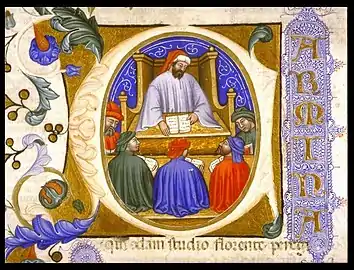 Boethius teaching his students (initial in a 1385 Italian manuscript of the Consolation of Philosophy) | |
| Born | c. 477[1] |
| Died | 524 (aged about 44) |
Notable work | The Consolation of Philosophy |
| Era | Medieval philosophy |
| Region | Western philosophy |
| School | Neoplatonism |
Main interests | problem of universals, theology, music |
Notable ideas | The Wheel of Fortune |
Influenced
| |
Blessed Severinus Boethius | |
|---|---|
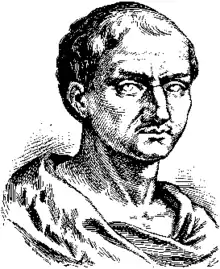 | |
| Born | Rome, Kingdom of Odoacer |
| Died | Pavia, Ostrogothic Kingdom |
| Venerated in | Roman Catholic Diocese of Pavia |
| Major shrine | San Pietro in Ciel d'Oro, Pavia, Italy |
| Feast | 23 October (Orthodox Tradition) |
| Influences | Augustine of Hippo |
| Influenced | Thomas Aquinas |
| Part of a series on |
| Neoplatonism |
|---|
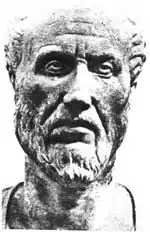 |
|
|
Early life and rise to power
Boethius was born in Rome to a patrician family around 480,[5] but his exact birth date is unknown.[3] His family, the Anicii, included emperors Petronius Maximus and Olybrius and many consuls.[3] His grandfather, a senator by the same name, was appointed as Praetorian Prefect of Italy. He died in 454, during the palace plot against magister militum Flavius Aetius.[6] Boethius' father, Manlius Boethius, who was appointed consul in 487, died while Boethius was young. Another patrician, Quintus Aurelius Memmius Symmachus, adopted and raised Boethius, instilling in him a love for literature and philosophy.[7]
Both Memmius Symmachus and Boethius were fluent in Greek, an increasingly rare skill at the time in the Western Empire; for this reason, some scholars believe that Boethius was educated in the East. According to John Moorhead, the traditional view is that Boethius studied in Athens, based on Cassiodorus' rhetoric describing Boethius' learning in one of his letters, though this does appear to be a misreading of the text for Boethius' simple facility with the works of Greek philosophers.[8]
Pierre Courcelle has argued that Boethius studied at Alexandria with the Neoplatonist philosopher Ammonius Hermiae. However, Moorhead observes that the evidence supporting Boethius having studied in Alexandria "is not as strong as it may appear", and adds that Boethius may have been able to acquire his formidable learning without travelling.[9]
On account of his erudition, Boethius entered the service of Theodoric the Great at a young age and was already a senator by the age of 25.[10] His earliest documented acts on behalf of the Ostrogothic ruler were to investigate allegations that the paymaster of Theodoric's bodyguards had debased the coins of their pay; to produce a waterclock for Theodoric to give to king Gundobad of the Burgunds; and to recruit a lyre-player to perform for Clovis, king of the Franks.[11]
Boethius married his foster-father's daughter, Rusticiana; their children included two boys, Symmachus and Boethius.
During Theodoric's reign, Boethius held many important offices, including the consulship in the year 510, but Boethius confesses in his The Consolation of Philosophy that his greatest achievement was to have both his sons made co-consuls for the same year (522),[12] one representing the east and the other the west, and finding himself sitting "between the two consuls and as if it were a military triumph [letting his] largesse fulfill the wildest expectations of the people packed in their seats around [him]".[13]
In 522, the same year his two sons were appointed joint consuls, Boethius accepted the appointment to the position of magister officiorum, the head of all the government and court services.[14]
Fall and death

In 520 Boethius was working to revitalize the relationship between the Roman See and the Constantinopolitan See; though still both a part of the same Church, disagreements had begun to emerge between them. This may have set in place a course of events that would lead to loss of royal favour.[14] Five hundred years later, this continuing disagreement led to the East–West Schism in 1054, in which communion between the Catholic Church and Eastern Orthodox Church was broken.
In 523 Boethius fell from power. After a period of imprisonment in Pavia for what was deemed a treasonable offence, he was executed in 524.[5][15] The primary sources are in general agreement over the facts of what happened. At a meeting of the Royal Council in Verona, the referendarius Cyprianus accused the ex-consul Caecina Decius Faustus Albinus of treasonous correspondence with Justin I. Boethius leapt to his defense, crying, "The charge of Cyprianus is false, but if Albinus did that, so also have I and the whole senate with one accord done it; it is false, my Lord King."[16]
Cyprianus then also accused Boethius of the same crime and produced three men who claimed they had witnessed the crime. Boethius and Basilius were arrested. First the pair were detained in the baptistery of a church, then Boethius was exiled to the Ager Calventianus, a distant country estate, where he was put to death. Not long afterwards Theodoric had Boethius' father-in-law Symmachus put to death, according to Procopius, on the grounds that he and Boethius together were planning a revolution, and confiscated their property.[17]
"The basic facts in the case are not in dispute," writes Jeffrey Richards. "What is disputed about this sequence of events is the interpretation that should be put on them."[18] Boethius claims his crime was seeking "the safety of the Senate". He describes the three witnesses against him as dishonorable: Basilius had been dismissed from Royal service for his debts, while Venantius Opilio and Gaudentius had been exiled for fraud.[19] However, other sources depict these men in a far more positive light. For example, Cassiodorus describes Cyprianus and Opilio as "utterly scrupulous, just and loyal" and mentions they are brothers and grandsons of the consul Opilio.[20]
Theodoric was feeling threatened by international events. The Acacian Schism had been resolved, and the Nicene Christian aristocrats of his kingdom were seeking to renew their ties with Constantinople. The Catholic Hilderic had become king of the Vandals and had put Theodoric's sister Amalafrida to death,[21] and Arians in the East were being persecuted.[22] Then there was the matter that with his previous ties to Theodahad, Boethius apparently found himself on the wrong side in the succession dispute following the untimely death of Eutharic, Theodoric's announced heir.
The method of Boethius' execution varies in the sources. Perhaps he was killed with an axe or a sword, or possibly he was clubbed to death, or possibly hanged.[23] According to another version a rope was attached round his head and tightened till his eyes bulged out; then his skull was cracked. In any case, his remains were entombed in the church of San Pietro in Ciel d'Oro in Pavia, also the resting place of Augustine of Hippo. In Dante's The Divine Comedy, Paradise, Canto X, lines 121–29, the spirit of Boethius is pointed out by Saint Thomas Aquinas:
Now if thy mental eye conducted be
From light to light, as I resound their frame,
The eighth well worth attention thou wilt see.
The soul who pointed out the world's dark ways,
To all who listen, its deceits unfolding.
Beneath in Cieldauro lies the frame
Whence it was driven; -from woe and exile, to
This fair abode of peace and bliss it came.
Past historians have had a hard time accepting a sincere Christian who was also a serious Hellenist.[24] Arnaldo Momigliano argues that "many people have turned to Christianity for consolation. Boethius turned to paganism. His Christianity collapsed—it collapsed so thoroughly that perhaps he did not even notice its disappearance." However, this view does not reflect the majority of current scholarship on the matter.[25] The community that he was part of valued both classical and Christian culture.[26]
Works
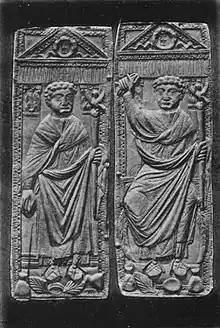
Dates of composition[27]
- Mathematical works
- De arithmetica (On Arithmetic, c. 500) adapted translation of the Introductionis Arithmeticae by Nicomachus of Gerasa (c. 160 – c. 220).
- De musica (On Music, c. 510), based on a lost work by Nicomachus of Gerasa and on Ptolemy's Harmonica.
- Possibly a treatise on geometry, extant only in fragments.[28]
- Logical Works
- A) Translations
- Porphyry's Isagoge
- In Categorias Aristotelis: Aristotle's Categories
- De interpretatione vel periermenias: Aristotle's De Interpretatione
- Interpretatio priorum Analyticorum (two versions): Aristotle's Prior Analytics
- Interpretatio Topicorum Aristotelis: Aristotle's Topics
- Interpretatio Elenchorum Sophisticorum Aristotelis: Aristotle's Sophistical Refutations
- B) Commentaries
- In Isagogen Porphyrii commenta (two commentaries, the first based on a translation by Marius Victorinus, (c. 504–05); the second based on Boethius' own translation (507–509).
- In Categorias Aristotelis (c. 509–11)
- In librum Aristotelis de interpretatione Commentaria minora (not before 513)
- In librum Aristotelis de interpretatione Commentaria majora (c. 515–16)
- In Aristotelis Analytica Priora (c. 520–523)
- Commentaria in Topica Ciceronis (incomplete: the end the sixth book and the seventh are missing)
- Original Treatises
- De divisione (515–520?)
- De syllogismo cathegorico (505–506)
- Introductio ad syllogismos cathegoricos (c. 523)
- De hypotheticis syllogismis (516–522)
- De topicis differentiis (c. 522–23)
- Opuscula Sacra (Theological Treatises)
- De Trinitate (c. 520–21)
- Utrum Pater et Filius et Spiritus Sanctus de divinitate substantialiter praedicentur (Whether Father and Son and Holy Spirit are Substantially Predicated of the Divinity)
- Quomodo substantiae in eo quod sint bonae sint cum non sint substantialia bona [also known as De hebdomadibus] (How Substances are Good in that they Exist, when They are not Substantially Good)
- De fide Catholica
- Contra Eutychen et Nestorium (Against Eutyches and Nestorius)
- De consolatione Philosophiae (524–525).
De consolatione philosophiae
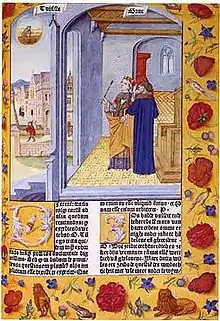
Boethius's best known work is the Consolation of Philosophy (De consolatione philosophiae), which he wrote most likely while in exile under house arrest or in prison while awaiting his execution.[29] This work represented an imaginary dialogue between himself and philosophy, with philosophy personified as a woman.[29] The book argues that despite the apparent inequality of the world, there is, in Platonic fashion, a higher power and everything else is secondary to that divine Providence.[4]
Several manuscripts survived and these were widely edited, translated and printed throughout the late 15th century and later in Europe.[29] Beyond Consolation of Philosophy, his lifelong project was a deliberate attempt to preserve ancient classical knowledge, particularly philosophy. Boethius intended to translate all the works of Aristotle and Plato from the original Greek into Latin.[30][31][32]
De topicis differentiis
His completed translations of Aristotle's works on logic were the only significant portions of Aristotle available in Latin Christendom from the sixth century until the 12th century. However, some of his translations (such as his treatment of the topoi in The Topics) were mixed with his own commentary, which reflected both Aristotelian and Platonic concepts.[29]
Unfortunately, the commentaries themselves have been lost.[33] In addition to his commentary on the Topics, Boethius composed two treatises on Topical argumentation, In Ciceronis Topica and De topicis differentiis. The first work has six books, and is largely a response to Cicero's Topica.[34] The first book of In Ciceronis Topica begins with a dedication to Patricius. It includes distinctions and assertions important to Boethius's overall philosophy, such as his view of the role of philosophy as "establish[ing] our judgment concerning the governing of life",[35] and definitions of logic from Plato, Aristotle and Cicero. He breaks logic into three parts: that which defines, that which divides, and that which deduces.[35]
He asserts that there are three types of arguments: those of necessity, of ready believability, and sophistry.[36] He follows Aristotle in defining one sort of Topic as the maximal proposition, a proposition which is somehow shown to be universal or readily believable.[37] The other sort of Topic, the differentiae, are "Topics that contain and include the maximal propositions"; means of categorizing the Topics which Boethius credits to Cicero.[38]
Book II covers two kinds of topics: those from related things and those from extrinsic topics. Book III discusses the relationship among things studied through Topics, Topics themselves, and the nature of definition. Book IV analyzes partition, designation and relationships between things (such as pairing, numbering, genus, and species, etc.). After a review of his terms, Boethius spends Book V discussing Stoic logic and Aristotelian causation. Book VI relates the nature of the Topic to causes.
In Topicis Differentiis has four books; Book I discusses the nature of rhetorical and dialectical Topics together, Boethius's overall purpose being "to show what the Topics are, what their differentiae are, and which are suited for what syllogisms."[39] He distinguishes between argument (that which constitutes belief) and argumentation (that which demonstrates belief). Propositions are divided into three parts: those that are universal, those that are particular, and those that are somewhere in between.[40] These distinctions, and others, are applicable to both types of Topical argument, rhetorical and dialectical. Books II and III are primarily focused on Topics of dialectic (syllogisms), while Book IV concentrates on the unit of the rhetorical Topic, the enthymeme. Topical argumentation is at the core of Boethius's conception of dialectic, which "have categorical rather than conditional conclusions, and he conceives of the discovery of an argument as the discovery of a middle term capable of linking the two terms of the desired conclusion."[41]
Not only are these texts of paramount importance to the study of Boethius, they are also crucial to the history of topical lore. It is largely due to Boethius that the Topics of Aristotle and Cicero were revived, and the Boethian tradition of topical argumentation spans its influence throughout the Middle Ages and into the early Renaissance: "In the works of Ockham, Buridan, Albert of Saxony, and the Pseudo-Scotus, for instance, many of the rules of consequence bear a strong resemblance to or are simply identical with certain Boethian Topics ... Boethius's influence, direct and indirect, on this tradition is enormous."[42]
It was also in De Topicis Differentiis that Boethius made a unique contribution to the discourse on dialectic and rhetoric. Topical argumentation for Boethius is dependent upon a new category for the topics discussed by Aristotle and Cicero, and "[u]nlike Aristotle, Boethius recognizes two different types of Topics. First, he says, a Topic is a maximal proposition (maxima propositio), or principle; but there is a second kind of Topic, which he calls the differentia of a maximal proposition ..."[43] Maximal propositions are "propositions [that are] known per se, and no proof can be found for these."[44]
This is the basis for the idea that demonstration (or the construction of arguments) is dependent ultimately upon ideas or proofs that are known so well and are so fundamental to human understanding of logic that no other proofs come before it. They must hold true in and of themselves. According to Stump, "the role of maximal propositions in argumentation is to ensure the truth of a conclusion by ensuring the truth of its premises either directly or indirectly."[45] These propositions would be used in constructing arguments through the Differentia, which is the second part of Boethius' theory. This is "the genus of the intermediate in the argument."[46] So maximal propositions allow room for an argument to be founded in some sense of logic while differentia are critical for the demonstration and construction of arguments.
Boethius' definition of "differentiae" is that they are "the Topics of arguments ... The Topics which are the Differentiae of [maximal] propositions are more universal than those propositions, just as rationality is more universal than man."[47] This is the second part of Boethius' unique contribution to the field of rhetoric. Differentia operate under maximal propositions to "be of use in finding maximal propositions as well as intermediate terms," or the premises that follow maximal propositions.[48]
Though Boethius is drawing from Aristotle's Topics, Differentiae are not the same as Topics in some ways. Boethius arranges differentiae through statements, instead of generalized groups as Aristotle does. Stump articulates the difference. They are "expressed as words or phrases whose expansion into appropriate propositions is neither intended nor readily conceivable", unlike Aristotle's clearly defined four groups of Topics. Aristotle had hundreds of topics organized into those four groups, whereas Boethius has twenty-eight "Topics" that are "highly ordered among themselves."[49] This distinction is necessary to understand Boethius as separate from past rhetorical theories.
Maximal propositions and Differentiae belong not only to rhetoric, but also to dialectic. Boethius defines dialectic through an analysis of "thesis" and hypothetical propositions. He claims that "[t]here are two kinds of questions. One is that called, 'thesis' by the [Greek] dialecticians. This is the kind of question which asks about and discusses things stripped of relation to other circumstances; it is the sort of question dialecticians most frequently dispute about—for example, 'Is pleasure the greatest good?' [or] 'Should one marry?'."[50] Dialectic has "dialectical topics" as well as "dialectical-rhetorical topics", all of which are still discussed in De Topicis Differentiis.[43] Dialectic, especially in Book I, comprises a major component of Boethius' discussion on Topics.
Boethius planned to completely translate Plato's Dialogues, but there is no known surviving translation, if it was actually ever begun.[51]
De arithmetica
Boethius chose to pass on the great Greco-Roman culture to future generations by writing manuals on music, astronomy, geometry and arithmetic.[10]
Several of Boethius' writings, which were hugely influential during the Middle Ages, drew on the thinking of Porphyry and Iamblichus.[52] Boethius wrote a commentary on the Isagoge by Porphyry,[53] which highlighted the existence of the problem of universals: whether these concepts are subsistent entities which would exist whether anyone thought of them, or whether they only exist as ideas. This topic concerning the ontological nature of universal ideas was one of the most vocal controversies in medieval philosophy.
Besides these advanced philosophical works, Boethius is also reported to have translated important Greek texts on the topics of the quadrivium [51] His loose translation of Nicomachus's treatise on arithmetic (De institutione arithmetica libri duo) and his textbook on music (De institutione musica libri quinque, unfinished) contributed to medieval education.[53] De arithmetica begins with modular arithmetic, such as even and odd, evenly even, evenly odd, and oddly even. He then turns to unpredicted complexity by categorizing numbers and parts of numbers.[54] His translations of Euclid on geometry and Ptolemy on astronomy,[55] if they were completed, no longer survive. Boethius made Latin translations of Aristotle's De interpretatione and Categories with commentaries.[14] In his article The Ancient Classics in the Mediaeval Libraries, James Stuart Beddie cites Boethius as the reason Aristotle's works were popular in the Middle Ages, as Boethius preserved many of the philosopher's works.[56]
De institutione musica
Boethius' De institutione musica was one of the first musical works to be printed in Venice between the years of 1491 and 1492. It was written toward the beginning of the sixth century and helped medieval authors during the ninth century understand Greek music.[57] Like his Greek predecessors, Boethius believed that arithmetic and music were intertwined, and helped to mutually reinforce the understanding of each, and together exemplified the fundamental principles of order and harmony in the understanding of the universe as it was known during his time.[58]
In "De Musica", Boethius introduced the threefold classification of music:[59]
- Musica mundana – music of the spheres/world; this "music" was not actually audible and was to be understood rather than heard
- Musica humana – harmony of human body and spiritual harmony
- Musica instrumentalis – instrumental music
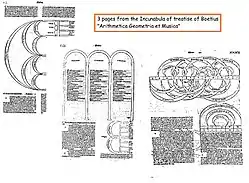
In De musica I.2, Boethius describes 'musica instrumentis' as music produced by something under tension (e.g., strings), by wind (e.g., aulos), by water, or by percussion (e.g., cymbals). Boethius himself doesn't use the term 'instrumentalis', which was used by Adalbold II of Utrecht (975–1026) in his Epistola cum tractatu. The term is much more common in the 13th century and later. It is also in these later texts that musica instrumentalis is firmly associated with audible music in general, including vocal music. Scholars have traditionally assumed that Boethius also made this connection, possibly under the header of wind instruments ("administratur ... aut spiritu ut tibiis"[lower-alpha 3] [60]), but Boethius himself never writes about "instrumentalis" as separate from "instrumentis" explicitly in his very brief description.
In one of his works within De institutione musica, Boethius said that "music is so naturally united with us that we cannot be free from it even if we so desired."[61]
During the Middle Ages, Boethius was connected to several texts that were used to teach liberal arts. Although he did not address the subject of trivium, he did write many treatises explaining the principles of rhetoric, grammar, and logic. During the Middle Ages, his works of these disciplines were commonly used when studying the three elementary arts.[55] The historian R. W. Southern called Boethius "the schoolmaster of medieval Europe."[62]
An 1872 German translation of "De Musica" was the magnum opus of Oscar Paul.[63]
Opuscula sacra
Boethius also wrote Christian theological treatises, which supported Catholicism and condemned Arianism and other heterodox forms of Christianity.[64]
Five theological works are known:[65]
- De Trinitate – "The Trinity", where he defends the Council of Chalcedon Trinitarian position, that God is in three persons who have no differences in nature. He argues against the Arian view of the nature of God, which put him at odds with the faith of the Arian King of Italy.
- Utrum Pater et filius et Spiritus Sanctus de divinitate substantialiter praedicentur – "Whether Father, Son and Holy Spirit are Substantially Predicated of the Divinity," a short work where he uses reason and Aristotelian epistemology to argue that the Catholic views of the nature of God are correct.[66]
- Quomodo substantiae
- De fide catholica – "On the Catholic Faith"
- Contra Eutychen et Nestorium – "Against Eutyches and Nestorius," from around 513, which dates it as the earliest of his theological works. Eutyches and Nestorius were contemporaries from the early to mid-5th century who held divergent Christological theologies. Boethius argues for a middle ground in conformity with Roman Catholic faith.
His theological works played an important part during the Middle Ages in philosophical thought, including the fields of logic, ontology, and metaphysics.[67]
History of reception
| Part of a series on |
| Scholasticism |
|---|
 |
|
Lorenzo Valla described Boethius as the last of the Romans and the first of the scholastic philosophers.[12] Despite the use of his mathematical texts in the early universities, it is his final work, the Consolation of Philosophy, that assured his legacy in the Middle Ages and beyond. This work is cast as a dialogue between Boethius himself, at first bitter and despairing over his imprisonment, and the spirit of philosophy, depicted as a woman of wisdom and compassion. "Alternately composed in prose and verse,[52] the Consolation teaches acceptance of hardship in a spirit of philosophical detachment from misfortune".[68]
Parts of the work are reminiscent of the Socratic method of Plato's dialogues, as the spirit of philosophy questions Boethius and challenges his emotional reactions to adversity. The work was translated into Old English by King Alfred, although Alfred's authorship of this Old English translation has recently been questioned, and into later English by Chaucer and Queen Elizabeth.[64] Many manuscripts survive and it was extensively edited, translated and printed throughout Europe from the 14th century onwards.[69] Many commentaries on it were compiled, and it has been one of the most influential books in European culture. No complete bibliography has ever been assembled, but it would run into thousands of items.[68]
"The Boethian Wheel" is a model for Boethius' belief that history is a wheel,[70] a metaphor that Boethius uses frequently in the Consolation; it remained very popular throughout the Middle Ages, and is still often seen today. As the wheel turns, those who have power and wealth will turn to dust; men may rise from poverty and hunger to greatness, while those who are great may fall with the turn of the wheel. It was represented in the Middle Ages in many relics of art depicting the rise and fall of man. Descriptions of "The Boethian Wheel" can be found in the literature of the Middle Ages from the Romance of the Rose to Chaucer.[71]
De topicis differentiis was the basis for one of the first works of logic in a western European vernacular, a selection of excerpts translated into Old French by John of Antioch in 1282.[72]
Veneration

Boethius is recognized as a martyr for the Catholic faith by the Roman Martyrology, though to Watkins "his status as martyr is dubious".[73] His cult is held in Pavia, where Boethius's status as a saint was confirmed in 1883, and in the Church of Santa Maria in Portico in Rome. His feast day is 23 October.[74][73][75] In the current Martyrologium Romanum, his feast is still restricted to that diocese.[76] Pope Benedict XVI explained the relevance of Boethius to modern day Christians by linking his teachings to an understanding of Providence.[10] He is also venerated in the Eastern Orthodox Church.[77]
In popular culture
In the novel A Confederacy of Dunces by John Kennedy Toole, Boethius is the favorite philosopher of main character Ignatius J. Reilly. "The Boethian Wheel" is a theme throughout the book, which won the Pulitzer Prize for Fiction in 1981.[78]
Peter Glassgold translated Boethius's poems on the consolation of philosophy "out of the original Latin into a diverse historical Englishings diligently collaged," (Sun and Moon Press, 1994).[79]
C.S. Lewis references Boethius in chapter 27 of the Screwtape Letters. [80]
Boethius also appears in the 2002 film "24 Hour Party People" where he is played by Christopher Eccleston. As Tony Wilson passes by, Boethius (disguised as a beggar) says, "It's my belief that history is a wheel. "Inconstancy is my very essence" -says the wheel- "Rise up on my spokes if you like, but don't complain when you are cast back down into the depths. Good times pass away, but then so do the bad. Mutability is our tragedy, but it is also our hope. The worst of times, like the best, are always passing away."
See also
Notes
- The name Anicius demonstrated his connection with a noble family of the Lower Empire, while Manlius claims lineage from the Manlii Torquati of the Republic. The name Severinus was given to him in honour of Severinus of Noricum.[3]
- In English, the o and e in Boethius are pronounced separately: /boʊˈiːθiəs/. It is hence traditionally written with a diæresis, viz. "Boëthius", a spelling which has been disappearing due to the limitations of typewriters.
- "Haec vero administratur aut intentione ut nervis, aut spiritu ut tibiis, vel his, quae ad aquam moventur, aut percussione quadam, ut in his, quae in concava quaedam aerea feriuntur, atque inde diversi efficiuntur soni." Translated: "This, however, is operated by the motion of a string, or the wind of a pipe, or to those, which are moved by the water, or the beat of time, as in the following, which is striking a kind of brass hollow, and in the other are made of a corresponding sound."
References
- Anicius Manlius Severinus Boethius Stanford Encyclopedia of Philosophy
- A.D. Smith, Anselm's Other Argument, Harvard University Press, 2014, p. 66.
- Hodgkin, Thomas (2001), Italy and Her Invaders, London: Adamant Media Corporation.
- "Boethius", The Online Library of Liberty, retrieved 23 October 2017.
- Noel Harold Kaylor; Philip Edward Phillips (2012), A Companion to Boethius in the Middle Ages, Brill, pp. 1–, ISBN 978-90-04-18354-4, retrieved 19 January 2013
- Heather, P. J. (Peter J.) (2006). The fall of the Roman Empire : a new history of Rome and the Barbarians. Oxford: Oxford University Press. pp. 244–245. ISBN 9780199978618. OCLC 806039879.
- Boethius (1969), De consolatione philosophiae, translated by Watts, V.E., Harmonsworth: Penguin, 2.3, p. 59.
- Noel Harold Kaylor; Philip Edward Phillips (2012), A Companion to Boethius in the Middle Ages, Brill, pp. 4–, ISBN 978-90-04-18354-4, retrieved 19 January 2013
- Moorhead (2009), "Boethius' life and the world of late antique philosophy", in Marenbon, John (ed.), The Cambridge Companion to Boethius, Cambridge: Cambridge University Press, p. 29.
- Pope Benedict XVI (12 March 2008), Boethius and Cassiodorus, archived from the original on 28 December 2008, retrieved 4 November 2009.
- Cassiodorus (1992), Variae, translated by Barnish, S.J.B., Liverpool: University Press, I.10, pp. 12–14; I.45, 20–23; II.40, 38–43.
- Boethius, Anicius Manlius Severinus. The Theological Tractates and The Consolation of Philosophy. Translated by H. F. Steward and E. K. Rand. Cambridge: The Project Gutenberg, 2004.
- De consolatione philosophiae, 2.3; translated by Watts, p. 60
- "Anicius Manlius Severinus Boethius", MacTutor History of Mathematicas archive, U of St Andrews, 2000, retrieved 4 November 2009.
- Boethius (2007), The Theological Tractates and The Consolation of Philosophy, Digireads.com, pp. 5–, ISBN 978-1-4209-2975-1, retrieved 22 January 2013
- Anonymous Valesianus, 14.85; text and English translation of this document is in J. C. Rolfe (trans.), Ammianus Marcellinus (Cambridge: Harvard University Press, 1972), vol. 3 pp. 562ff
- History of the Wars, 5.1.34. Text and translation in H. B. Dewing, Procopius (London: Heinemann, 1968), vol. 3 p. 12f
- Richards, The Popes and the Papacy in the Early Middle Ages (London: Routledge and Kegan Paul, 1979), p. 114
- De consolatione I.4.3; translated by V. E. Watts, Boethius: The consolation of philosophy (Harmondsworth: Penguin, 1969), p. 42
- Cassiodorus, Variae, V.40, 41
- Bury, J. B., History of the Later Roman Empire, p.158, Macmillan & Co., Ltd. 1923
- Richards, Popes and the Papacy, p. 119
- Fried, Johannes (2015). The Middle Ages (third ed.). Cambridge, MA and London: The Belknap Press of Harvard University Press. p. 1. ISBN 978-0-674-05562-9.
- Lindberg, David C. (1980), Science in the Middle Ages, University of Chicago Press, pp. 10–, ISBN 978-0-226-48233-0, retrieved 12 January 2013
- Walsh, P.G. (2000), "Introduction", The Consolation of Philosophy, Oxford: Oxford U. Press, p. xxvii.
- Noel Harold Kaylor; Philip Edward Phillips (2012), A Companion to Boethius in the Middle Ages, Brill, pp. 14–, ISBN 978-90-04-18354-4, retrieved 19 January 2013
- Phillips, Philip Edward (2012), "Anicius Manlius Severinus Boethius: A Chronology and Selected Annotated Bibliography", in Noel Harold Kaylor Jr.; Philip Edward Phillips (eds.), A Companion to Boethius in the Middle Ages, Leiden: Brill, pp. 551–589.
- Folkerts, Menso, ed. (1970), Boethius' Geometrie II. Ein mathematisches Lehrbuch des Mittelalters, Wiesbaden: Franz Steiner
- Boethius, Anicius Manlius Severinus. Consolation of Philosophy. Translated by Joel Relihan. Norton: Hackett Publishing Company, 2001.
- Spade, Paul Vincent (15 March 2016), "Medieval Philosophy", Stanford Encyclopedia of Philosophy, retrieved 23 October 2017
- Thomas Aquinas; Frederick Christian Bauerschmidt (2005), Holy Teaching: Introducing the Summa Theologiae of St. Thomas Aquinas, Brazos Press, pp. 14–, ISBN 978-1-58743-035-0, retrieved 22 March 2013
- Rubenstein, Richard E. (2004). Aristotle's Children. Houghton Mifflin Harcourt. pp. 62–. ISBN 978-0-547-35097-4. Retrieved 22 March 2013.
- Stump, Eleonore (1988), Introduction, In Ciceronis Topica, by Boethius, Cornell University Press, p. 3, ISBN 978-0801489341
- Stump, Eleanor (1988), Introduction, In Ciceronis Topica, by Boethius, Cornell University Press, p. 22, ISBN 978-0801489334
- Boethius (1988), In Ciceronis Topica, translated by Stump, Eleonore, Cornell University, p. 25
- Stump, Eleanor (1988), Introduction, In Ciceronis Topica, by Boethius, Cornell University Press, p. 26, ISBN 978-0801489341
- Boethius. In Ciceronis Topica. 34
- Boethius. In Ciceronis Topica. 35
- Boethius (1978), De topicis differentiis, translated by Stump, Eleonore, Cornell University Press, p. 29, ISBN 978-0801489334
- Boethius (1978), De topicis differentiis, translated by Stump, Eleonore, Cornell University Press, p. 31, ISBN 978-0801489334
- Stump, Eleonore (1978), Introduction, De topicis differentiis, by Boethius, Cornell University Press, p. 6, ISBN 9780801489334
- Stump, Eleonore (1978), Introduction, De topicis differentiis, by Boethius, Cornell University Press, pp. 7, 9–8, ISBN 978-0801489334.
- Stump, Eleonore (1978), "Dialectic and Boethius's De topicis differentiis", De topicis differentiis, by Boethius, Cornell University Press, p. 180, ISBN 978-0801489334.
- Boethius (1978), De topicis differentiis, translated by Stump, Eleonore, Cornell University Press, p. 33, ISBN 978-0801489334
- Stump, Eleonore (1978), "Dialectic and Boethius's De topicis differentiis", De topicis differentiis, by Boethius, Cornell University Press, p. 181, ISBN 978-0801489334
- Stump, Eleonore (1978), "Dialectic and Boethius's De topicis differentiis", De topicis differentiis, by Boethius, Cornell University Press, p. 198, ISBN 978-0801489334
- Boethius (1978), De topicis differentiis, translated by Stump, Eleonore, Cornell University Press, p. 48, ISBN 978-0801489334
- Stump, Eleonore (1978), "Dialectic and Boethius's De topicis differentiis", De topicis differentiis, by Boethius, Cornell University Press, p. 204, ISBN 978-0801489334.
- Stump, Eleonore (1978), "Dialectic and Boethius's De topicis differentiis", De topicis differentiis, by Boethius, Cornell University Press, p. 205, ISBN 978-0801489334
- Boethius (1978), De topicis differentiis, translated by Stump, Eleonore, Cornell University Press, p. 35, ISBN 978-0801489334
- Cassiodorus (1992), Variae, translated by Barnish, S.J.B., Liverpool: University Press, I.45.4.
- Marenbon, John (2016), "Anicius Manlius Severinus Boethius", Stanford Encyclopedia of Philosophy, retrieved 23 October 2017
- Herbermann, Charles, ed. (1913). . Catholic Encyclopedia. New York: Robert Appleton Company..
- Schrader, Dorothy V (1968), "De Arithmetica, Book I, of Boethius", Mathematics Teacher, 61: 615–28.
- Masi, Michael (1979), "The Liberal Arts and Gerardus Ruffus' Commentary on the Boethian De Arithmetica", The Sixteenth Century Journal, 10 (2): 24, doi:10.2307/2539405, JSTOR 2539405.
- Beddie, James Stuart (1930), "The Ancient Classics in the Mediaeval Libraries", Speculum, 5 (1): 3–20, doi:10.2307/2846353, JSTOR 2846353, S2CID 163314872, p. 3
- Boethius, Anicius Manlius Severinus (1989), Palisca, Claude V. (ed.), Fundamentals of Music, translated by Bower, Calvin M., New Haven: Yale University Press, ISBN 978-0300039436.
- Grout, Donald (1980). A History of Western Music (3rd ed.). New York: W.W. Norton & Company. p. 24. ISBN 978-0393951363.
- Bower, Calvin M. (2006), "The transmission of ancient music theory into the Middle Ages", in Christensen, Thomas (ed.), The Cambridge History of Western Music Theory, Cambridge University Press, pp. 136–167, ISBN 978-0521686983, p. 146.
- Boethius 1867, p. 189.
- Boethius, Anicius Manlius Severinus (1989), Palisca, Claude V. (ed.), Fundamentals of Music, translated by Bower, Calvin M., New Haven: Yale University Press, p. 8, ISBN 978-0300039436.
- Herman, Arthur (2013). The Cave and the Light. Random House. ISBN 978-0553807301.
- Paul, Oscar (1872), Boetius und die griechische Harmonik (in German), Leipzig: F.E.C. Leuckart.
- Cooper, W.V. (1902), "Editorial Note", Consolation of Philosophy, by Boethius, Anicius Manlius Severinus, translated by W.V. Cooper, London: J.M. Dent and Company.
- Noel Harold Kaylor; Philip Edward Phillips (2012), A Companion to Boethius in the Middle Ages, Brill, pp. 15–, ISBN 978-90-04-18354-4, retrieved 19 January 2013
- Speer, Andreas (2011), "The Division of Metaphysical Discourses: Boethius, Thomas Aquinas, and Meister Eckhart", in Emery, Kent; Friedman, Russell; Speer, Andreas (eds.), Philosophy and Theology in the Long Middle Ages: A Tribute to Stephen F. Brown, Leiden: Brill, pp. 91–116, ISBN 978-90-04-16942-5, p. 95
- Bradshaw, David (2009), "The Opuscula sacra: Boethius and theology", in Marenbon, John (ed.), The Cambridge Companion to Boethius, pp. 105–128, doi:10.1017/CCOL9780521872669.006, ISBN 978-1139002493
- James, H.R. (2007), Preface, Consolation of Philosophy, by Boethius, translated by H.R. James, Adelaide: The University of Adelaide.
- Dwyer, Richard A. (1976), Boethian Fictions: Narratives in the Medieval French Versions of the Consolatio Philosophiae, Medieval Academy of America.
- Boethius (1999), Consolation of Philosophy, translated by Watts, Victor (Rev ed.), Penguin, p. 24, n. 1.
- Carroll-Clark, Susan (1994), "The Wheel of Fortune", The Middle Ages.net.
- Jonathan Rubin (2018), "John of Antioch and the Perceptions of Language and Translation in Thirteenth-Century Acre", in John France (ed.), Acre and Its Falls: Studies in the History of a Crusader City, Brill, p. 93.
- Watkins, Basil (2016). The Book of Saints. St. Augustine's Abbey of Ramsgate, England (8th ed.). London: Bloomsbury. p. 108. ISBN 978-0567664150. OCLC 908373623.
- Farmer, David Hugh (2011). The Oxford Dictionary of Saints (5th ed.). Oxford: Oxford University Press. p. 53. ISBN 978-0199596607. OCLC 726871260.
- Martirologio (in Italian), translated by Stefano Calvi, archived from the original on 7 December 2010.
- Martyrologium Romanum (2nd ed.). Rome: Libreria Editrice Vaticana. 2004. p. 586. ISBN 978-8820972103.
- Latin Saints of the Orthodox Patriarchate of Rome
- Miller, Karl (1999-03-05). "An American tragedy. A lifetime of rejection broke John Kennedy Toole. But his aged mother believed in his talent, found a publisher for his novel and rescued his memory from oblivion". www.newstatesman.com. Retrieved 2018-06-09.
- Glassgold, Peter. "Beothius: The Poems from on the Consolation of Philosophy Translated out of the original Latin into diverse historical Englishings diligently collaged". Amazon. Retrieved 28 April 2019.
- Lewis, Clive (1942). The Screwtape Letters. Faded Page. p. 57. Retrieved 28 April 2019.
Works available online
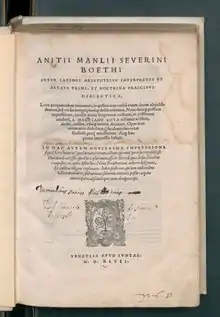
- James, H.R. (translator) [1897] (2007), The Consolation of Philosophy of Boethius, The University of Adelaide: eBooks @ Adelaide, archived from the original on 2007-04-27.
- Boethius, Anicius Manlius Severinus (1867). "De institutione arithmetica libri duo". In Gottfried Friedlein (ed.). Anicii Manlii Torquati Severini Boetii De institutione arithmetica libri duo: De institutione musica libri quinque. Accedit geometria quae fertur Boetii (in Latin). in aedibus B.G. Teubneri. pp. 1–173. Retrieved 2008-08-03.
- Boethius, Anicius Manlius Severinus (1867). "De institutione musica libri quinque". In Gottfried Friedlein (ed.). Anicii Manlii Torquati Severini Boetii De institutione arithmetica libri duo: De institutione musica libri quinque. Accedit geometria quae fertur Boetii (in Latin). in aedibus B.G. Teubneri. pp. 177–371. Retrieved 2015-10-08.
Bibliography
- Attwater, Donald; Catherine Rachel John (1995), The Penguin Dictionary of Saints, London: Penguin Books, ISBN 978-0-14-051312-7, OCLC 34361179.
- Baird, Forrest E.; Walter Kaufmann (2008), From Plato to Derrida, Upper Saddle River, New Jersey: Pearson Prentice Hall, ISBN 978-0-13-158591-1.
- Boethius, Anicius Manlius Severinus (1926), trans., H.F. Stewart, E.K. Rand, and "I.T.". The Theological Tractates and The Consolation of Philosophy. Cambridge, MA: Harvard, Loeb Classical Library, parallel text.
- Chadwick, Henry (1981), Boethius, the Consolations of Music, Logic, Theology, and Philosophy, Oxford: Clarendon Press, ISBN 978-0-19-826549-8, OCLC 8533668.
- Colish, Marcia L. (2002), Medieval Foundations of the Western Intellectual Tradition, 400–1400, New Haven: Yale University Press, ISBN 978-0-300-07852-7, OCLC 185694056.
- Magee, John (1989), Boethius on Signification and Mind, Leiden: Brill, ISBN 978-90-04-09096-5.
- Marenbon, John (2004), Boethius, Oxford: Oxford University Press, ISBN 978-0-19-513407-0, OCLC 186379876.
- Marenbon, John (2009), The Cambridge Companion to Boethius, Cambridge: Cambridge University Press, ISBN 978-0-521-87266-9.
- Papahagi, Adrian (2010). Boethiana Mediaevalia – A Collection of Studies on the Early Medieval Fortune of Boethius' Consolation of Philosophy. Bucharest: Zeta Books. ISBN 978-973-1997-79-7.
- Suto, Taki (2011), Boethius on Mind, Grammar and Logic. A Study of Boethius' Commentaries on Peri Hermeneias, Cambridge: Brill, ISBN 978-90-04-21418-7.
- Westfall, Joseph (2008), "Boethius: Kierkegaard and The Consolation", in Stewart, Jon (ed.), Kierkegaard and the Patristic and Medieval Traditions, Ashgate, pp. 207–222, ISBN 978-0-7546-6391-1.
| Library resources about Boethius |
| By Boethius |
|---|
External links
Works
| Wikisource has original works written by or about: Boethius |
| Wikiquote has quotations related to: Boethius |
| Wikimedia Commons has media related to Anicius Manlius Torquatus Severinus Boethius. |
| Latin Wikisource has original text related to this article: |
- Works by Boethius at Project Gutenberg
- Works by or about Boethius at Internet Archive
- Works by Boethius at LibriVox (public domain audiobooks)

- {en} De Trinitate (On the Holy Trinity) – Boethius, Erik Kenyon (trans.)
- {en} Theological Tractates; Christian Classics Ethereal Library
- A 10th-century manuscript of Institutio Arithmetica is available online from Lund University, Sweden
- The Geoffrey Freudlin 1885 edition of the Arithmetica, from the Cornell Library Historical Mathematics Monographs
- Online Galleries, History of Science Collections, University of Oklahoma Libraries High resolution images of works by Boethius in .jpg and .tiff format.
- Codices Boethiani: A Conspectus of Manuscripts of the Work of Boethius
- Works by Boethius at Perseus Digital Library
- MS 1083/30 Regiment of princes; Consolation of philosophy at OPenn
- MS 484/15 Commentum super libro Porphyrii Isagoge; De decim predicamentis at OPenn
On Boethius' life and works
- Blessed Severinus Boethius at Patron Saints Index
- Blackwood, Stephen. The Meters of Boethius: Rhythmic Therapy in the Consolation of Philosophy.
- Blackwood, Stephen (2015). The Consolation of Boethius as Poetic Liturgy. Oxford Early Christian Studies. Oxford University Press. p. 398. ISBN 978-0-19-871831-4.
- O'Connor, John J.; Robertson, Edmund F., "Boethius", MacTutor History of Mathematics archive, University of St Andrews.
- Phillips, Philip Edward. Boethius: A Selected Bibliography for Students
- Boethius at The Online Library of Liberty
- On Boethius and Cassiodorus – Pope Benedict XVI
On Boethius' logic and philosophy
- Marenbon, John. "Anicius Manlius Severinus Boethius". In Zalta, Edward N. (ed.). Stanford Encyclopedia of Philosophy.
- The Philosophical Works of Boethius. Editions and Translations
- Boethius' Logic and Metaphysics. An Annotated Bibliography
| Preceded by Flavius Inportunus (alone) |
Consul of the Roman Empire 510 |
Succeeded by Arcadius Placidus Magnus Felix, Flavius Secundinus |



